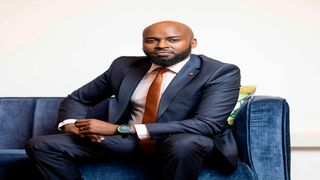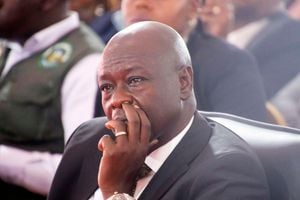
MyNetwork
Premium
Mark Masai: There’s always going to be an audience and stories to tell
What you need to know:
- Acting is not as easy as it may look. There are many moving pieces to make it a success and realising your part in the bigger scheme of things makes it picture-perfect.
- I love the experience and I believe this is not the last you have seen from the Faithless cast and crew. There is so much talent in there.
- The series is about a chama (and everyone is part of a chama in Kenya!) where four church women (think Women’s Guild) get caught up in a life of crime and deceit after being involved with Cain (mafia wa wash wash)
Mark Masai is a seasoned journalist with an exemplary career spanning over 16 years in mainstream media industry. He is an all-round communicator who currently practices PR, and has a wealth of experience as a professional moderator and MC across diverse stakeholder engagements. In a surprising and welcome pivot, Mark is debuting his acting career as a character in the new local crime drama series called Faithless.
1. You’re on TV, but as a star instead of - well, a media star. Is the camera different for you when you’re acting instead of reporting? Do you still have to cram lines and figure out positioning, facial expressions, things like that, or are they vastly different?
As a newcomer in the acting world, I see some differences from current affairs reporting and news anchoring but there are similarities. In both cases there is an audience, but I feel the viewers of Faithless show are from a wider pool. There could be a teenager watching, or retirees as well. Faithless is more of entertainment, and news is more about information, which calls for some differentiation in terms of tone and delivery.
In both instances, there is a script to follow, a story to tell, lights camera and action! However, there may be more elements of fiction with Faithless, much as they are drawn from real life situations and the society we live in. In both settings there is a level of dramatisation, with facial expressions and tone of voice for maximum impact.
2. What prompted the move into acting? A childhood dream, or an African-model-in-the-supermarket type discovery? How are you finding the acting world? What is Faithless about?
I have always been interested in performance. As a child I was part of a choir – The African Children’s Choir - and that prepared me for a life of capturing an audience.
Acting is not as easy as it may look. There are many moving pieces to make it a success and realising your part in the bigger scheme of things makes it picture-perfect. I love the experience and I believe this is not the last you have seen from the Faithless cast and crew. There is so much talent in there.
The series is about a chama (and everyone is part of a chama in Kenya!) where four church women (think Women’s Guild) get caught up in a life of crime and deceit after being involved with Cain (mafia wa wash wash). The story revolves around them and their friends and family. Then there is the investigation part of it, which is where I come in as Detective Henry. I am the good cop who works against the forces of the system with the police system that also incorporates and enables the bad guys. The Kenyan society is captured in there quite creatively. There’s something for everyone to relate to.
3. Do you feel like there are things about yourself that are reflected in the character you play, or has it made you reflect about what you would do in some of the situations you find your character in?
I am definitely the guy who would try do things by the book. Detective Henry abides by that but kwa ground, vitu ni different, as he finds out. He pushes through, regardless.
4. Journalism in itself is taking quite a hit in many ways - with the consistent evolution of the digital world, and now, with AI, and the promise of cheaper labour. What would you encourage younger journalists to do, especially those in school, to be able to move with the changing times? What is it that pioneers before them, like you, are doing to pave the way?
What is happening is an inevitability to all industries and sectors. Development is disruptive. I would say instead of looking to join the few available opportunities (dwindling, to be precise), look at ways of creating that opportunity for self and others. There’s always going to be an audience and stories to tell. The question you need to answer is, where are they? How are they consuming news/information and entertainment? Don’t despair - just be creative. You can work with the tools of AI to make your work better. Embrace the digital revolution. Explore the platforms.
5. You recently started a new project, tell us about that and where we can find it, and continue to watch you...
In line with my personal exploration of the opportunities out there, I have logged into the digital world in partnership with one of the biggest podcasting platforms on the continent, SemaBox Africa. Two weeks after my lay-off, we started ‘The Social Newsroom,’ which you can catch every Monday at 6pm on YouTube @SemaBOXAfrica, and all our social media platforms.
We address current affairs, and seek to be thought leaders and shapers of agenda. We also get personal, and speak to newsmakers and trailblazers, breaking some conventional rules in the process as we have fun. Come join us!





